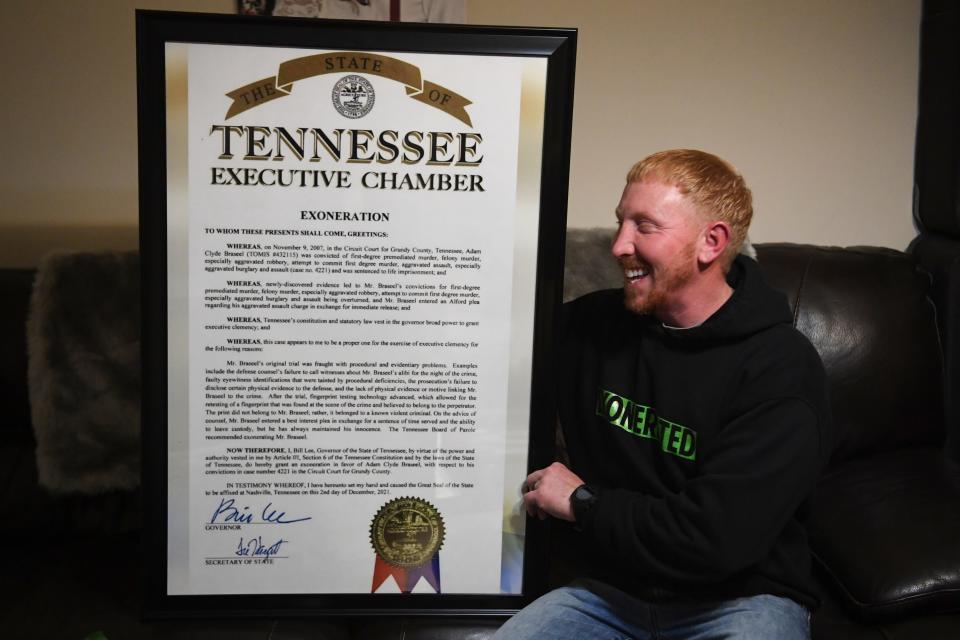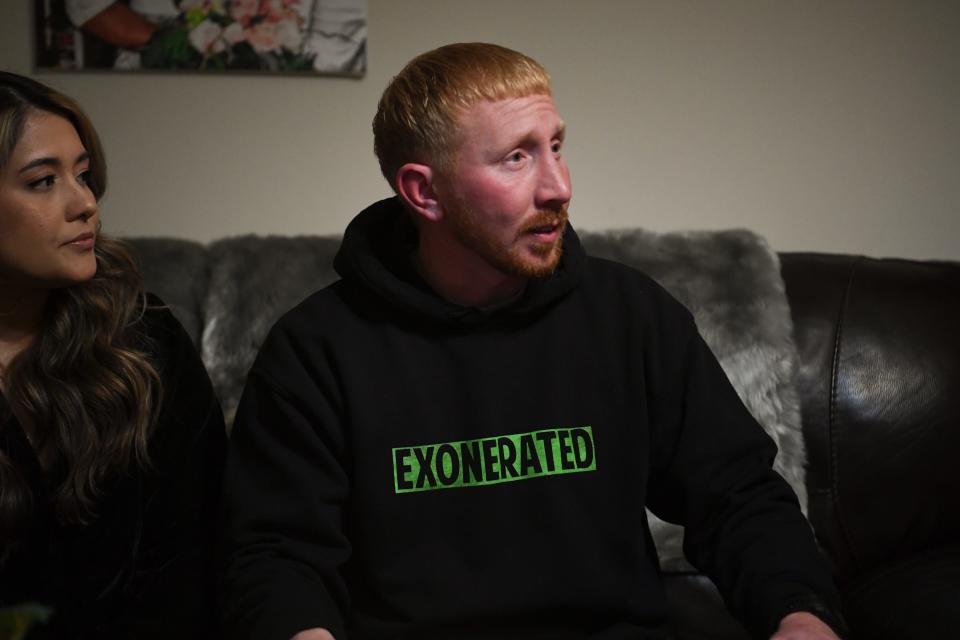Adam Braseel, now exonerated, says in new lawsuit officers framed him for murder
- Oops!Something went wrong.Please try again later.
Adam Braseel, the Tennessee man who spent 12 years in prison for a murder he didn’t commit, has filed a federal civil rights lawsuit against Grundy County and a handful of police officers, who, the lawsuit says, framed him and put him behind bars.
Braseel was tried and imprisoned for the 2006 murder of 60-year-old Malcom Burrows. Gov. Bill Lee exonerated Braseel in late 2021.
The suit, filed this week in Chattanooga, is against Grundy County, the estate of former Grundy County Sheriff Brent Myers (who died in 2020), former Deputy Chief Lonnie Cleek, former deputy Andrew West and former Tennessee Bureau of Investigation officer Larry Davis.

The lawsuit says the officers failed to interview more than one of Braseel’s alibi witnesses, failed to investigate fingerprints on the scene that would’ve cleared Braseel, and intentionally failed to conduct a thorough investigation.
The lawsuit says police were given possible motives from other people but the motives were never provided to Braseel’s attorneys during his first trial. It says police fabricated evidence, such as altering police reports to make Braseel appear guilty.
Investigators' original motive for the crime centered on Braseel murdering a man for his wallet, and police removed the wallet from the murder scene in an attempt to make Braseel look guilty, the lawsuit states.
A spokesperson for Grundy County did not immediately respond to a request for comment.
Braseel’s attorney, Kathleen Zellner, could not be reached for comment. Zellner is a Chicago-based attorney who specializes in exoneration lawsuits. She rose to fame by representing Steven Avery, whose trial was the focus of the hit Netflix series “Making a Murderer."
A murder and an assault
Braseel spent more than a decade in a state penitentiary for the 2006 murder of Burrows, who died on a rural road near Tracy City in Grundy County. The redhead was connected to the murder only after being identified in a photo lineup. No forensic evidence ever tied him to the crime.
Burrows’ sister, Rebecca Hill, and her son were staying with Burrows at the time. Around 9 p.m. on Jan. 7, 2006, a man came to the door looking for help with his car, which he said had broken down along the road, according to the lawsuit, and asked Burrows for help.

When the two got to the man’s car, he attacked Burrows, likely with a tire iron, killing him, the lawsuit says. He went back to the house to kill Hill, but while he was attacking her, her son stopped him, saving her life.
The lawsuit says Kermit Eugene Bryson is the man who murdered Burrows and attacked Hill, but no charges were ever brought against him. Bryson was a local felon who died by suicide two years after the Burrows murder while on the run for killing Grundy County deputy Shane Tate.
In 2017, Bryson’s fingerprints were found on the passenger door handle of Burrows' car at the murder scene. Braseel and Bryson resembled each other, both with small builds and red hair.
The path to exoneration
In 2015, Twelfth Judicial Circuit Judge Justin Angel threw out the guilty verdict and ordered a new trial, freeing Braseel for months before the state Court of Criminal Appeals overruled that decision and sent him back to prison.
He was granted a new trial two years later when fingerprints found on the passenger door handle of Burrows' car at the murder scene didn't belong to Braseel.

That retrial ended in 2019 when Braseel entered what’s known as an Alford plea — meaning he didn’t admit guilt but acknowledged there was enough evidence to convict — to aggravated assault. He had already served more time than that conviction would have allowed.
In 2020, the Tennessee Board of Parole unanimously recommended Braseel for exoneration, and a year later Lee followed through. An exoneration is the highest act of clemency under Tennessee law, and it means Lee does not believe Braseel committed the crime for which he was convicted.
In an exclusive interview with Knox News earlier this year, Braseel said his life has changed and through the process he met his wife, Racquel, but certain aspects of his healing are still hard.
“It doesn’t change the fact that they’ve done me terribly, terribly wrong,” he said. “Because so much good has come from what people have meant for evil ... when you take gold and put it in a refining pot and off into that fiery furnace, it melts, as everybody says, but it also purifies it, it refines it. It makes it more and more valuable.”
Tyler Whetstone is an investigative reporter focused on accountability journalism. Connect with Tyler by emailing him at tyler.whetstone@knoxnews.com. Follow him on Twitter @tyler_whetstone. Make our community, our society and our republic stronger by supporting robust local journalism. Subscribe online at knoxnews.com/subscribe.
This article originally appeared on Knoxville News Sentinel: Adam Braseel says in lawsuit that officers framed him for murder

